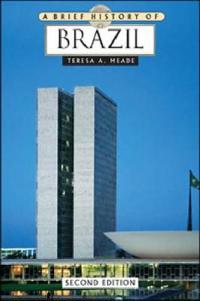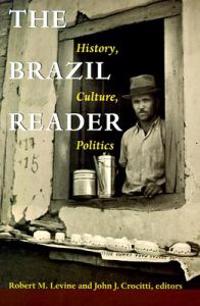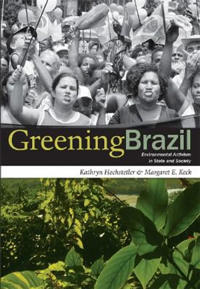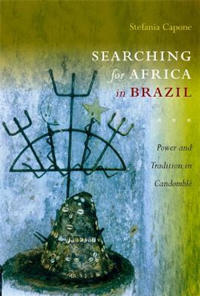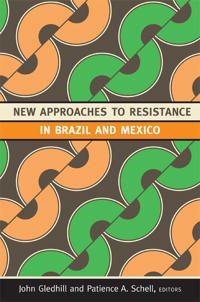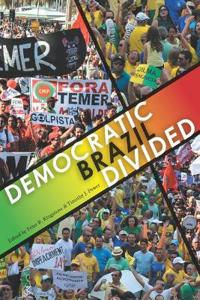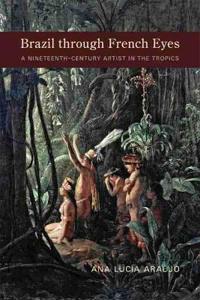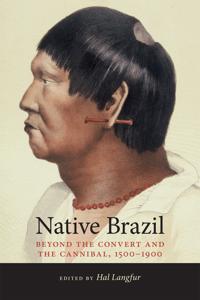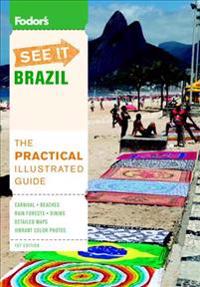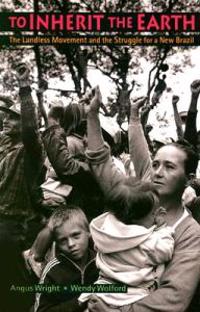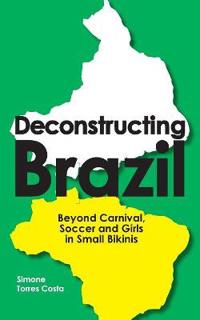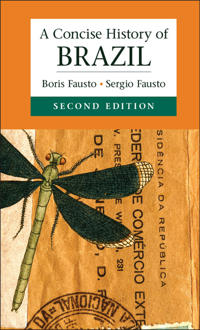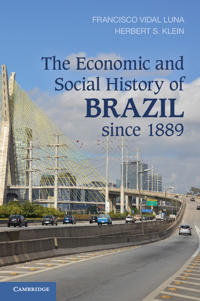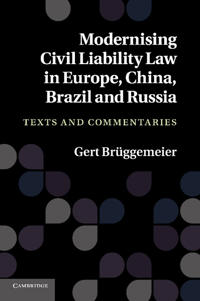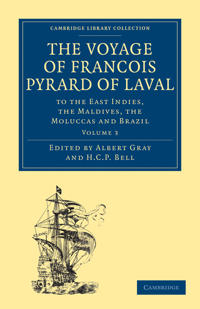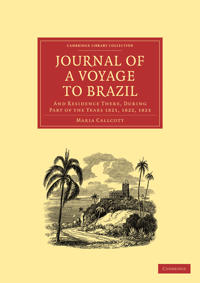The New Brazil (Häftad)
avRiordan Roett
ISBN: 9780815721680 - UTGIVEN: 201106The New Brazil tells the story of South America's largest country as it evolved from a remote Portuguese colony into a regional leader; a respected representative for the developing world; and, increasingly, an important partner for the United States and the European Union. In this engaging book, R[...]
A Brief History of Brazil (häftad)
ISBN: 9780816077892 - UTGIVEN: 2009-11Only slightly smaller in size than the United States, Brazil is the fifth largest country in the world. It is home to exotic Rio de Janeiro, the mighty Amazon River, the world-renowned Carnival, and of course, its shrinking rainforests. A Brief History of Brazil offers a concise yet comprehensive ac[...]
Achieving World Class Education in Brazil (Häftad)
avBarbara Bruns
ISBN: 9780821388549 - UTGIVEN: 2011-11Over the past 15 years, Brazil has introduced a consistent program of reforms of its education system, progressively aligning the educational attainment of its labor force with that of other middle income countries and introducing advanced student assessment and monitoring systems. Over the past 15 [...]
The Brazil Reader: History, Culture, Politics (Häftad)
avRobert M. Levine, John J. Crocitti
ISBN: 9780822322900 - UTGIVEN: 199905"Indispensable introduction to Brazil for students and general readers includes short scholarly articles, interviews, documents, photographs, and many autobiographical pieces. Begins with precontact indigenous peoples, but about half deals with Brazil since 1945. Topics include indigenous peoples, s[...]
Greening Brazil (Häftad)
avKathryn Hochstetler, Margaret E. Keck
ISBN: 9780822340317 - UTGIVEN: 2007-08"Greening Brazil" challenges the claim that environmentalism came to Brazil from abroad. Political scientists Kathryn Hochstetler and Margaret E. Keck retell the story of environmentalism in Brazil from the inside out, analyzing the extensive efforts within the country to save its natural environmen[...]
Searching for Africa in Brazil (Pocket)
avStefania Capone, Lucy Lyall (TRN) Grant, Stefania Capone
ISBN: 9780822346364 - UTGIVEN: 2010-04"Searching for Africa in Brazil" is a learned exploration of tradition and change in Afro-Brazilian religions. Focusing on the convergence of anthropologists' and religious leaders' exegeses, Stefania Capone argues that twentieth-century anthropological research contributed to the construction of an[...]
New Approaches to Resistance in Brazil and Mexico
ISBN: 9780822351870 - UTGIVEN: 2012-03Bringing together historically and ethnographically grounded studies of the social and political life of Brazil and Mexico, this collection of essays revitalizes resistance as an area of study. Resistance studies boomed in the 1980s and then was subject to a wave of critique in the 1990s. Covering t[...]
Democratic Brazil Divided
ISBN: 9780822964919 - UTGIVEN: 2017-10This is the third edited volume from these two scholars on the evolution of political institutions in Brazil. It follows Democratic Brazil: Actors, Institutions, and Processes (2000) and Democratic Brazil Revisited (2008). As they demonstrate, Brazil's democratic institutions are changing rapidly. T[...]
Brazil Through French Eyes
ISBN: 9780826337450 - UTGIVEN: 2015-10In 1858 Francois-Auguste Biard, a well-known sixty-year-old French artist, arrived in Brazil to explore and depict its jungles and the people who lived there. What did he see and how did he see it? In this book historian Ana Lucia Araujo examines Biard's Brazil with special attention to what she cal[...]
Native Brazil (Häftad)
ISBN: 9780826338419 - UTGIVEN: 2014-02The earliest European accounts of Brazil's indigenous inhabitants focused on the natives' startling appearance and conduct--especially their nakedness and cannibalistic rituals--and on the process of converting them to clothed, docile Christian vassals. This volume contributes to the unfinished task[...]
Space and Society in Central Brazil: A Panara! Ethnography (Pocket)
avElizabeth Ewart
ISBN: 9780857857262 - UTGIVEN: 2013-11-21Society and Government in Colonial Brazil, 1500-1822 (Inbunden)
avA. J. R. Russell-Wood
ISBN: 9780860783336 - UTGIVEN: 1992-09-24Fodor's See It: Brazil (Häftad)
avSheila Hawkins
ISBN: 9780876371473 - UTGIVEN: 201206Welcome to Brazil South America's largest country is booming and tourists are flocking to the culturally rich nation Home of the 2014 FIFA World Cup and the 2016 Olympic Games, millions of vacationers are excited to explore the country's beaches, carnivals, and world-renowned landmarks (Cristo Red[...]
To Inherit the Earth: The Landless Movement and the Struggle for a New Brazil (Häftad)
avAngus Lindsay Wright, Wendy Wolford
ISBN: 9780935028904 - UTGIVEN: 2003-05Boy in Brazil (Häftad)
avSeth Burkett
ISBN: 9780992658526 - UTGIVEN: 2014-04A charming and insightful account of life as the only English professional footballer in Brazil, host nation of the 2014 World Cup finals.[...]
Brazil (häftad)
ISBN: 9781101878323 - UTGIVEN: 2015-10As host of the 2016 Summer Olympics, Brazil promises to be one of the hottest travel destinations in upcoming years. And the country is primed to celebrate. From the picturesque beaches of Rio de Janeiro to the majestic Iguacu Falls to the wonders of the Amazon rainforest, Brazil offers something fo[...]
High Courts And Economic Governance In Argentina And Brazil (Inbunden)
avDiane Kapiszewski
ISBN: 9781107008281 - UTGIVEN: 2012-09-24Based on fieldwork in Argentina and Brazil, this study analyzes how elected leaders and high courts interacted over neoliberal restructuring.[...]
A Concise History of Brazil (Inbunden)
avBoris Fausto, Sergio (CON) Fausto, Arthur (TRN) Brakel
ISBN: 9781107036208 - UTGIVEN: 2014-08The second edition of A Concise History of Brazil offers a sweeping yet accessible history of Latin America's largest country. Boris Fausto examines Brazil's history from the arrival of the Portuguese in the New World through the long and sometimes rocky transition from independence in 1822 to democ[...]
The Economic and Social History of Brazil Since 1889 (Pocket)
avFrancisco Vidal Luna, Herbert S. Klein, Francisco Vidal Luna
ISBN: 9781107616585 - UTGIVEN: 2014-03This is the first complete economic and social history of Brazil in the modern period in any language. It provides a detailed analysis of the evolution of the Brazilian society and economy from the end of the empire in 1889 to the present day. The authors elucidate the basic trends that have defined[...]
A Concise History of Brazil (Pocket)
avBoris Fausto, Sergio (CON) Fausto, Arthur (TRN) Brakel
ISBN: 9781107635241 - UTGIVEN: 2014-08The second edition of A Concise History of Brazil offers a sweeping yet accessible history of Latin America's largest country. Boris Fausto examines Brazil's history from the arrival of the Portuguese in the New World through the long and sometimes rocky transition from independence in 1822 to democ[...]
Modernising Civil Liability Law in Europe, China, Brazil and Russia (Pocket)
avGert Breggemeier
ISBN: 9781107682061 - UTGIVEN: 2014-06Non-contractual liability, stemming from damage accountably caused to another, has been the subject of the PETL and DCFR VI European reform initiatives. Gert Bruggemeier, however, proposes alternative reforms which, instead of trying to overcome the differences between civil law (delict) and common [...]
The Voyage of Francois Pyrard of Laval to the East Indies, the Maldives, the Moluccas and Brazil (Pocket)
avFrancois Pyrard, Albert (EDT) Gray, Albert (TRN) Gray
ISBN: 9781108013475 - UTGIVEN: 2010-11The publications of the Hakluyt Society (founded in 1846) made available edited early accounts of exploration. The first series, which ran from 1847 to 1899, consists of 100 books containing published or previously unpublished works by authors from Christopher Columbus to Sir Francis Drake, and cove[...]
Journal of a Voyage to Brazil, and Residence There, During Part of the Years 1821, 1822, 1823
ISBN: 9781108018289 - UTGIVEN: 2010-09The daughter of a naval officer, throughout her life Maria Graham (later Callcott) combined her passion for adventure with a diligent attention to scholarship and self-improvement. A talented linguist, children's author, travel writer and self-confessed 'tomboy', by the time Journal of a Voyage to B[...]
Making Brazil Work (Inbunden)
avMarcus Andre Melo, Carlos Pereira
ISBN: 9781137310835 - UTGIVEN: 2013-08-21This book offers the first conceptually rigorous analysis of the political and institutional underpinnings of Brazil's recent rise. Using Brazil as a case study in multiparty presidentialism, the authors argue that Brazil's success stems from the combination of a constitutionally strong president an[...]


